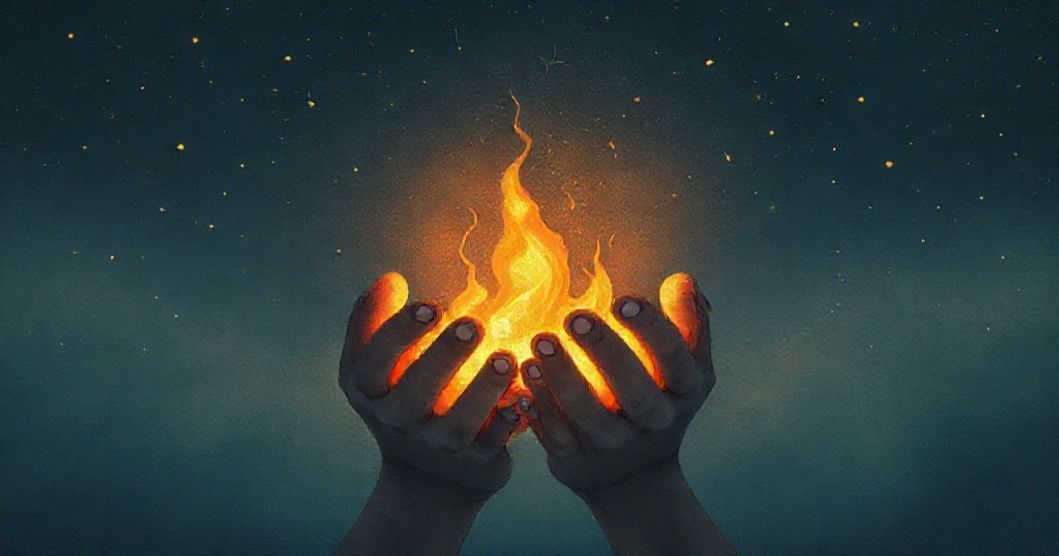Core Symbols: Embers, Constellations, and the Humming of Transition
Funeral embers in dreams carry the paradox of warmth and residue—like the last glow of a dying fire, they represent what remains after something significant has ended. Unlike ash, embers hold potential; they’re not fully extinguished, hinting at unprocessed energy or memories waiting to be acknowledged. When you cradle these embers, your hands become both caretaker and witness, suggesting a tender relationship with endings. Meanwhile, funeral constellations introduce a celestial dimension: stars are fixed, eternal, and patterned, yet their 'funeral' framing reimagines them as guides rather than just observers. The 'humming' adds texture—subtle, persistent, almost musical, like the quiet rhythm of the universe itself.
The constellation imagery shifts the funeral from a solitary, somber event to a cosmic ritual. In mythology, constellations often symbolize stories passed down through generations—your dream might be weaving personal narratives into a larger tapestry of existence. The 'humming' could represent the subconscious’s attempt to make sense of chaos, turning noise into melody, just as grief can transform into understanding. Together, these symbols create a visual poem: you’re holding onto what’s left of the past while the universe’s silent song reminds you of continuity.
Psychology Lens: Unfinished Business and the Dream Work of Closure
Want a More Personalized Interpretation?
Get your own AI-powered dream analysis tailored specifically to your dream
🔮Try Dream Analysis FreeFrom a Jungian perspective, funeral dreams often emerge during shadow work—confronting parts of ourselves we’ve neglected or lost. The embers here might symbolize the 'shadow self' we’re trying to integrate, not abandon. Jung believed dreams are messengers from the collective unconscious, and constellations could represent archetypal patterns: the 'wise old one' (a symbol of wisdom gained through loss) or the 'star' as a guiding light in darkness. Your act of cradling embers isn’t passive; it’s an active choice to engage with what’s ending, not flee from it.
Neuroscience offers another layer: during REM sleep, the brain processes emotional memories, turning raw data into narrative. If you’ve recently experienced a loss (big or small), your dream might be replaying that trauma in symbolic form—like a funeral as a metaphor for letting go of old habits or identities. The 'humming' could be your brain’s attempt to soothe itself, using rhythm and pattern to organize fragmented emotions. Freud might call this 'dream work'—the transformation of repressed feelings into manageable symbols, allowing you to process grief without waking in a panic.
Life Triggers: When Endings Whisper Through Your Subconscious
This dream often surfaces during periods of significant transition—career shifts, relationship endings, or even the loss of a routine. If you’ve recently left a job, ended a friendship, or changed your daily rhythm, your subconscious might be processing those endings through the lens of 'funeral constellations'—acknowledging the 'death' of a chapter while recognizing the stars (your values, skills, or relationships) that remain. The 'humming' could signal that these endings aren’t random; they’re part of a larger cosmic order.
It also appears when you’re grieving something less tangible: a lost version of yourself, unfulfilled potential, or a relationship that felt 'dead' long before it ended. The cradling action suggests you’re not ready to let go fully, even if you logically know the relationship or phase is over. This tension between wanting to hold on and needing to release is common in midlife transitions or after a period of stagnation—your subconscious is staging a funeral to clear space for new growth.
What To Do Next: From Cradling to Letting Flow
Start with short-term reflection: Grab a notebook and write down the exact details of the dream—how did the embers feel? Were the constellations bright or dim? What did the 'humming' remind you of in waking life? This act of naming the symbols externalizes the subconscious’s message, making it less overwhelming. Notice if you felt peaceful, anxious, or neutral—emotions in dreams often reveal unspoken truths.
For medium-term exploration, create a 'closure ritual' for whatever is ending. This could be as simple as burning a letter to someone who’s left your life, or planting a symbolic plant to represent new growth. The key is to treat the 'funeral' as a respectful goodbye, not a permanent farewell. If the 'humming' felt comforting, try incorporating gentle, rhythmic activities into your daily routine—like humming while cooking or walking—to mirror that cosmic persistence.
Long-term integration means asking: What light do I want to carry forward? The embers aren’t just remnants—they’re fuel. What skills, memories, or lessons from the ending can you use to shape your next chapter? The constellations remind you that even in darkness, there’s order. Journal weekly about how you’re 'cradling' your embers—are you nurturing them or letting them die? This practice turns passive dreaming into active self-awareness.
FAQ
Q: I haven’t lost anything recently—why am I dreaming this? A: Your dream might process a metaphorical 'death'—like a job you’re outgrowing, a relationship that’s emotionally distant, or a part of yourself you’re abandoning. The 'funeral' is about letting go of outdated patterns, not just tangible losses.
Q: What does the 'humming' specifically symbolize? A: The hum is your subconscious’s way of finding rhythm in chaos. It could represent the sound of healing, the universe’s heartbeat, or even a memory of comfort (like a lullaby). Notice if it felt urgent or gentle—this hints at how you’re approaching endings.
Q: Is this dream a warning or a sign of something to come? A: Dreams rarely predict the future; they reflect your current emotional state. The 'funeral constellations' are more about honoring the past than fearing the future—they’re a reminder that endings create space for new stories, not just silence.
